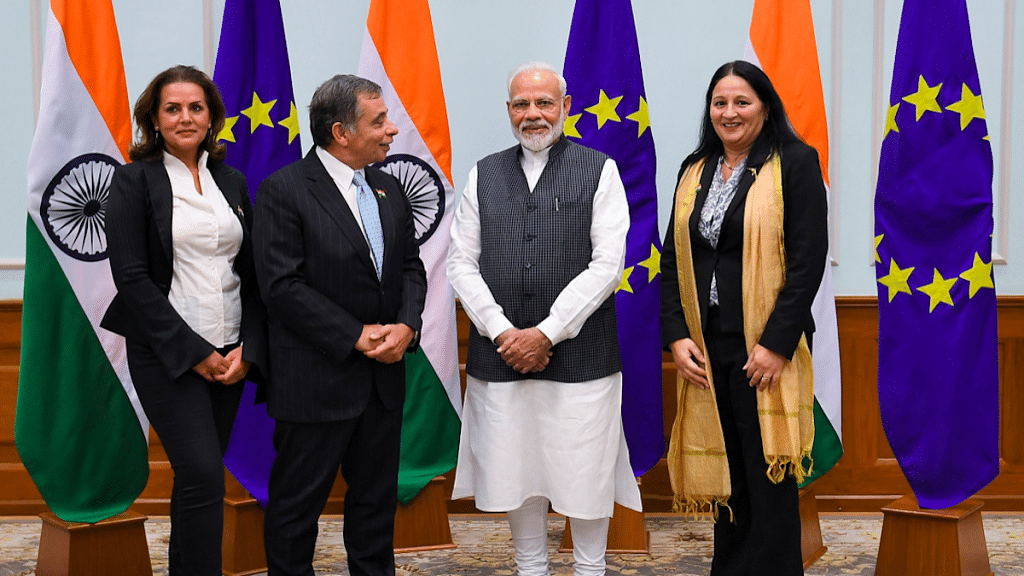Is PM Narendra Modi’s high-profile diplomacy obscuring serious foreign policy challenges for India? A recent hearing at the United States House of Representatives Sub Committee on Human Rights should give pause to policymakers in New Delhi.
From New York to Silicon Valley to Houston, Modi’s foreign policy initiatives have garnered much attention. Modi has personalised diplomacy with visible interactions in informal settings with leaders ranging from Barack Obama to Xi Jinping. Add to this the government’s posture vis-à-vis Pakistan and it is clear that on foreign policy, PM Modi is able to satisfy his domestic audience that feels India is “punching below its weight” as Brahma Chellaney, a national security expert, described it. But is the world buying it?
Also read: Several European parliamentarians visiting Kashmir are from Right-wing, anti-Islam parties
Going gets tougher
The basic storyline about India is as follows: it is an emerging global power with a growing economy and pluralistic democratic traditions. This combination makes India an attractive partner for Western democracies, especially the United States. While Russia may be enemy number one in popular perception, there is no doubt that the American foreign policy establishment views China as the real long-term challenge.
For India too, China presents a formidable challenge. With China-Pakistan relations in an ever-tighter embrace, India and the US have common interests not just in South Asia, but in the broader Asia-Pacific. This makes the case for a closer US-India relationship a slam dunk, as American basketball aficionados might call it.
Unsurprisingly, much effort and optimism are being invested in securing a closer strategic alliance between the world’s oldest and its largest democracy. At the Congressional human rights hearing, both Democrats and Republicans alluded to the importance of America and India’s shared values of pluralism and democracy. But this hearing was tougher on India than many expected.
Frustratingly for those who work on strengthening the India-US relationship, the going has been tougher than expected.
There are a variety of issues that dog the relationship. And there are two reasons of particular interest.
The first is that India’s economic heft is still not where it needs to be for it to take more mind space in Washington and other Western capitals. The second has to do with the rise of majoritarianism as a governing ideology in India.
Also read: How foreign media coverage of Kashmir crisis has become a headache for Modi govt
Not the calling card India needs
On the first point, it is no secret that economic power is an integral part of a modern national security strategy. A perusal of US government strategy documents shows that economic well-being has been long-recognised as a pillar of national security. The latest 2017 national security strategy is replete with references to the US economy. Tellingly, the document frequently refers to China as a serious rival in both military and economic terms.
China’s importance may seem obvious, but data makes things clearer. While China’s per capita income is far below that of the US and Europe, its economy has deep connections with economies around the world. In 2017, China was the biggest exporter and second biggest importer in the world. The US-China trade ($585 billion) was not far behind India’s total trade with all nations ($738 billion).
According to the World Bank’s country classification system, China is the only large country (by population) that jumped from low income to lower-middle-income to upper middle-income status between 1990 and 2016. Without a reformed and stronger economy that is fully integrated with global value chains, India is unlikely to measure up to the world’s great powers.
The other complicating factor is that the United States and the European Union still emphasise on liberal values. At the Congressional hearing, Kashmir took up much of the discussion time and US politicians were clearly expressing concern about what they felt were anti-democratic and illiberal moves by the Modi government in Kashmir and Assam. The US administration’s representatives at the hearing were more measured and diplomatic. However, they don’t face the pressures that politicians face from their constituents. Democrats especially were critical.
Modi’s endorsement of Trump in Houston may also have created some unpleasantness. All this must be seen within the context of numerous reports in international media on mob lynchings, rising intolerance, and general fears over minority rights in India.
Also read: Tough message for Modi: Political winds are shifting, from nationalism to economy, jobs
Modi may have gotten a group of Members of the European Parliament (MEPs) to visit Jammu and Kashmir this week, but it is likely to further damage India’s reputation. Most of these MEPs belong to far-Right parties, known for their anti-immigrant and illiberal views. Mind you, the Modi government did not allow Indian opposition MPs and senior United States Senator, Chris Van Hollen, to visit Kashmir. What message is India sending to the world?
India’s calling cards abroad so far have been Mahatma Gandhi and the secular democracy he died for. If India loses Gandhi’s ideals, a tighter embrace with key allies such as the United States will be that much more difficult. Without internal social cohesion, India’s economy will definitely underperform. Social cohesion and economic growth are interlinked.
Unfortunately, as The Economist notes in its recent special report on India, “Narendra Modi is damaging India’s economy as well as its democracy”. Blaming international media for “unfair” reporting isn’t going to help. Stepping back from the RSS-BJP majoritarian agenda will. It is in India’s national interest to do so.
The author is a politician, writer, and development expert. Views are personal.
